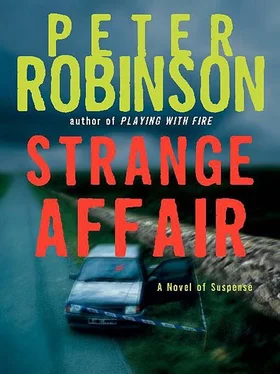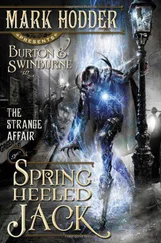“Annie, it’s me, Alan.”
“Where are you? I’ve been wanting to speak to you ever since I heard. I’m really sorry about what happened to your brother.”
“Thanks, I appreciate it. I’m back in London. Where are you?”
“As a matter of fact,” Annie said, “I’m in Selfridge’s at the moment, in one of the changing rooms. You might not have heard, but they’ve closed King’s Cross. Bomb threat. Anyway, it means I’m stuck here for another night. I need something to wear. I’m just about to head back to the hotel. Look, Alan, we have to talk again. A lot’s happened.”
“I know, but it’ll have to wait. Couple of quick questions. Have Brooke’s blokes talked to Gareth Lambert yet?”
“I don’t think so,” said Annie. “Last time I talked to him Dave didn’t seem all that interested. They’re concentrating on a couple of local lowlifes called Oliver Drummond and William Gilmore. Their names came up in your brother’s business correspondence and phone records.” Banks remembered the names, but they didn’t mean anything to him.
Then Annie told him about her visit to Alf Seaton’s that morning, the description of the man with the ponytail and what had become of the Mondeo. Banks knew immediately that it was one of the men who had followed him from Peterborough, the one who had made the gesture.
“Another thing you might as well know,” Annie said. “It looks as if your brother’s girlfriend had an abortion, arranged through the Berger-Lennox Centre. That’s when he met Jennifer Clewes.”
“Jesus,” said Banks. “That’ll be Corinne you’re talking about?”
“Are there any others?”
“Probably,” said Banks, “but I think she was the most recent model, the one before Jennifer. Thanks for telling me.”
“Can we meet up? We really should talk about all this.”
“Maybe tomorrow,” said Banks. “Breakfast? I’ve still got a couple of people to talk to tonight. How about I give you a bell when I’m finished?” Banks rang off before she could protest.
The rain was really pelting down now and all Banks had for protection was his light raincoat. He stood in the doorway of the closed shoe shop looking at the people drifting back and forth between the curtains of rain, then stepped out and headed as fast as he could for Tottenham Court Road tube station.
“How did you get my address?” Dr. Alex Lukas asked Annie as she stood under her umbrella on the front step of the Belsize Park house shortly after seven o’clock that evening. “I’m not in the telephone directory.”
“We have our sources,” said Annie, who had taken a peek at the personnel records when she made a quick, and otherwise fruitless, search of Jennifer Clewes’s office at the Berger-Lennox.
“Can I come in?” “What do you want? It’s not a police state yet, is it?”
“Not the last time I checked,” said Annie with a smile. “But it is raining fast.”
Dr. Lukas took the chain off the door and stepped back. Annie folded up her umbrella, took off her raincoat and hung it on the coat stand. She followed Dr. Lukas down the thick carpet into a cozy and comfortable living room. The curtains were still open and rain streaked across the windowpanes. The radio was playing quietly, an orchestral concert of some sort. Dr. Lukas excused herself for a moment and went upstairs. While she waited, Annie looked around the room.
What looked to Annie like original works of art hung on the wall, mostly abstract expressionist and cubist pieces, and various knickknacks and framed photographs stood on most available surfaces. The crowded dark-wood bookcase boasted a colorful array of spines, none of them medical. There were novels, mostly Tolstoy and Dostoyevsky, poetry by Mandelstam, Akhnatova, Yevtushenko, Tsvetayeva, and a few biographies, Shostakovich, Gorbachev, Pasternak. Annie could see by the lettering that some of the books were in Russian. Taking into account the matryoshka doll on the mantelpiece, and remembering the hint of an accent, it didn’t take much to surmise that Dr. Lukas hailed from Russia, or somewhere in the former Soviet Republic.
Beside the doll stood a black-and-white photograph of a family group in a wooded area: parents and three children. Annie walked over to have a closer look at it. They were all wearing overcoats and no one was smiling; they had that hard, pinched look you get when there isn’t enough food on the table or coal on the fire. Beside it stood another photo of what Annie took to be the parents, more recent and in color. This time they were smiling into the camera, standing beside a large lake in the sunshine.
“On holiday,” said Dr. Lukas, behind her.
“I’m sorry, I didn’t mean to be nosy,” said Annie. “Is that your parents?”
“Yes. It was taken two years ago.”
“So you come from Russia?”
“Ukraine. A city called L’viv, in the west, not far from the Polish border. Do you know it?”
“Sorry,” said Annie, whose geography was terrible.
“It doesn’t matter.”
Annie gestured to the photograph again. “Do they still live there?”
Dr. Lukas paused before answering with a tentative “Yes.”
“How long have you been here?”
“Thirteen years. I was twenty-five when the Soviet Union broke up. I was lucky. I got into medical school in Edinburgh. I’d had some training in L’viv, of course, but this country didn’t recognize my qualifications. Do you know how many foreigntrained doctors there are over here driving minicabs and working in restaurants and hotels?”
“No,” said Annie.
“It’s a shame, a terrible waste,” said Dr. Lukas, with a hint of tragic fatalism in her voice.
“You don’t have a very strong accent,” Annie said.
“I worked hard to get rid of it. Foreign accents don’t work in your favor here. But all this is beside the point. What have you come to see me about?”
Dr. Lukas was perching uncomfortably at the edge of an armchair, Annie noticed, body hunched forward and tense, hands clasped in her lap. She was wearing faded jeans and a man’s white casual shirt, no makeup. She looked tired and drawn, as she had in her office.
“You’re right,” said Annie. “It’s not a social call.” She paused and searched for the right way to begin. “Look, in a murder investigation, people sometimes hide things, mask the truth. Not because they’re guilty, but because they’ve maybe committed some minor crime and they’re afraid we’ll uncover it and prosecute them. Do you understand?”
“I’m listening.”
“When that happens, it makes a difficult job even harder. We don’t know what’s important and what isn’t, so how can we know where to focus our line of inquiry?”
“All jobs have their difficulties,” said Dr. Lukas. “Mine included. I don’t see what point there is in you telling me how hard yours is.”
“I thought if you understood, then you’d see reason and tell me the truth.”
“Pardon?”
“I think you heard me.”
“But I’m not sure I heard you correctly. Are you suggesting I lied?”
“I’m saying that you might be hiding something because you think it reflects badly on you. I don’t think you’re lying so much as you’re obscuring the truth. Now it may or may not be important, or it may not seem important to you, but I’d like to know what it is, and I think you’d like to tell me.”
“What makes you think that?”
“You get to know people in this job. I think you’re a decent person and I think you’re under a tremendous amount of pressure. Now that could simply be a matter of your work, or it could be due to personal problems which are nothing at all to do with this investigation. But the feeling I get is that there’s something else, and that it is connected.”
Читать дальше












